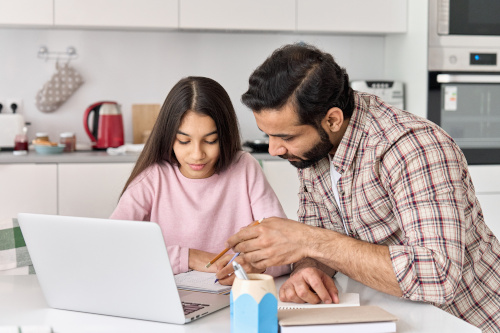For parents and caregivers, supporting your child’s learning can be stressful. Academic concepts are taught differently than they used to be. In addition, we’re all grappling with a scarcity of time and juggling competing priorities. It is hard to keep up–especially if you don’t have the resources to do so.
At Brooklyn Landmark Elementary School, we recognize that part of supporting students’ success is supporting families. Research shows students who have families engaged in their learning are more likely to attend school regularly, have improved social skills and behavior, and achieve high levels of academic performance.
One of our goals is to build the capacity of our families to make supporting their child’s learning as easy and accessible as possible. For example, we offer family coffee chats and family workshops that provide practical strategies and ways to support their own mental health and wellbeing—as well as their children’s.
Here are three strategies that have resonated with our families:
1. Try “learning by teaching”
You don’t need to be a content expert to support your children’s learning. A unique approach is to allow students to be the teachers. “Learning by teaching” (also known as the protégé effect) is a simple yet underused learning strategy that has proven results. Research shows that when students teach a concept, they develop a deeper and more persistent understanding of the material. This is a wonderful way for parents to reinforce what their child is learning in the classroom into their daily after-school routine.
We partnered with nonprofit PowerMyLearning to bring this strategy to life through their Family Playlists innovation. The organization also recently launched this free collection of K-8 activities for families who want to test “learning by teaching” at home.
When our students teach their parents what they’re learning, it helps them develop a deeper understanding of the material and improves overall academic achievement. One example of how this made a huge difference is with a kindergarten student at my school, Jahid. Through Family Playlists, Jahid’s teacher, Mrs. Sikder-Ali, and his mom, Ms. Henry, realized that Jahid learns best through learning games. They found he was far more engaged than with traditional homework. Ms. Henry also noticed something Mrs. Sikder-Ali had not; he was mixing up his numbers and saying “19” instead of “90.”
“In a class with more than 20 children, it might be difficult for Mrs. Sikder to notice such important but subtle detail,” Ms. Henry recently shared with me. “But, by using Family Playlists, I was able to communicate this to Mrs. Sikder, so we can both support Jahid at home and in the classroom.”
Bonus: If you want to help your child practice explaining ideas, have them create a video tutorial. They can practice skills like introducing the big picture, providing examples, and explaining steps. To get started, have your child use a concept map to organize information and show connections visually. Once the video is recorded, you can review it together and provide feedback.
2. Ask Questions
During homework time, ask your child guiding questions like the ones below to help them problem-solve using resources they have from class.
Try these helpful prompts before, during and after to nurture your child’s curiosity and agency.
Find Resources
- What are you learning in school that can help with this?
- Where can we find more information?
Explain the Process
- What strategy do you want to use? Why?
- Where should we start? What comes next?
Make Connections
- How does this connect to what you learned last week?
- When would you use this in the real world?
3. Team up with parents to support learning objectives
For a school to be truly effective, parents must be equal partners with teachers in their child’s education. This partnership can take many forms, such as engaging families in the learning objectives for the week, providing questions that parents can ask their student(s), and sending home activities they can do together.
- 4 ways to encourage play in education - April 25, 2024
- CoSN IT Leader Spotlight: Lisa Higgins - April 25, 2024
- It’s time to pay student teachers - April 25, 2024

